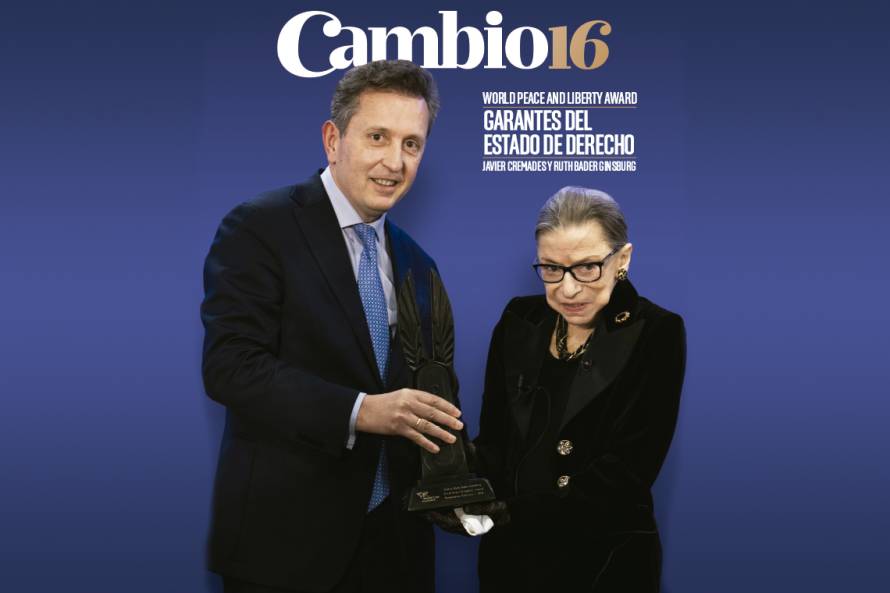First, my gratitude to the World Jurist Association for creating the Ruth Bader Ginsburg medal of honor, and for dedicating part of its 2021 Congress to her memory. It has been an honor and a pleasure for me to serve on the commission to select the extraordinarily distinguished inaugural recipients of the Ruth Bader Ginsburg award.
The title of this session of, “Mother, Jurist & Myth,” covers a great deal of ground; I will leave the mythological aspects to others. That said, I do not doubt that my mother would have been delighted to be elevated to the ranks of Athena, goddess of wisdom, and occasionally of just fights. On the other hand, she might have been less pleased to be the sole female celebrated for her intelligence in a male-dominated pantheon . . . a position she in fact occupied, unhappily, during the years in which she was the only woman justice on the Supreme Court, between the retirement of Justice Sandra Day O’Connor and the appointment of Justice Sonia Sotomayor.
Turning to the other categories – mother and jurist – as is well-known, my mother was both of these at a time when very few women, and even fewer mothers, were jurists. Not only was the bench practically devoid of women, but women’s presence in the bar or among the professorate was exceedingly sparse. Motherhood, in the late 1950s and early 1960s, when she was studying and then seeking to practice law, almost guaranteed exclusion from the profession. In going through her papers after she died, I found a letter from a leading New York law firm, which in 1958 had hired her as a summer associate, but then declined to offer her permanent employment. The letter did not explicitly acknowledge her maternity, but its reference to the superior competitiveness of those the firm did hire revealed the true reason for her failure to measure up, since all of the successful candidates were men.
Today the titles mother and jurist no longer form an oxymoron. Today’s event celebrates my mother’s role in that evolution (among other achievements). But she was not satisfied to see women enter the profession, which they have done in ever-greater numbers since the 1950s. She often observed that remaining and rising in the profession continue to pose challenges to women, and especially to mothers. The US falls far behind many industrialized democracies in its absence of a comprehensive paid family leave plan. And even where leave may be available, the ethos of many law firms and other businesses discourages having or caring for children, lest the young professional be put on the “mommy track” to permanent subordinate status and lower remuneration. The pandemic has also disproportionately punished mothers in the legal profession and well beyond: if one parent must stay home with the children when the schools are closed, that parent will be the one who makes less money, and guess who that is most likely to be. As my mother frequently emphasized, until fathers take – and revel in – equal responsibility for child-rearing and other domestic obligations, women will not have attained full equality.
How far are we from achieving male buy-in to gender equality? My mother’s career illustrates the strategy of awakening men to the depredations of sex discrimination through cases in which laws imposing gender differentials disadvantaged men. The most celebrated and successful of these cases was Weinberger v. Weisenfeld, the “baby case,” in which a unanimous Supreme Court ruled that granting a social security benefit so that widowed mothers could stay home to raise their children, while denying the same benefit to widowed fathers, violated the equal protection of the laws. Even one Justice who had dissented from earlier sex discrimination cases my mother had brought to the Court, joined his brethren (as they all then were) because the law discriminated against the baby.
Of course, as my mother would be the first to acknowledge, the law does not move forward until society does. It becomes possible to show that sex discrimination hurts men too when men, like Stephen Weisenfeld, take on roles traditionally associated with women. But even men whose own careers may have conformed closely to gender stereotypes may come to understand the importance of equal treatment of men and women if those men have daughters for whose success they aspire. My mother observed how that same recalcitrant Justice’s views evolved toward hers as his daughters grew up and struggled to advance careers and family.
It is my hope that the award that the World Jurist Association established in my mother’s honor will, by holding up the inspiring examples of 8 exceptional women jurists, contribute to the progress toward true equality of men and women in the legal profession and beyond.
Jane C. Ginsburg, daughter of United States Supreme Court Justice Ruth Bader Ginsburg

